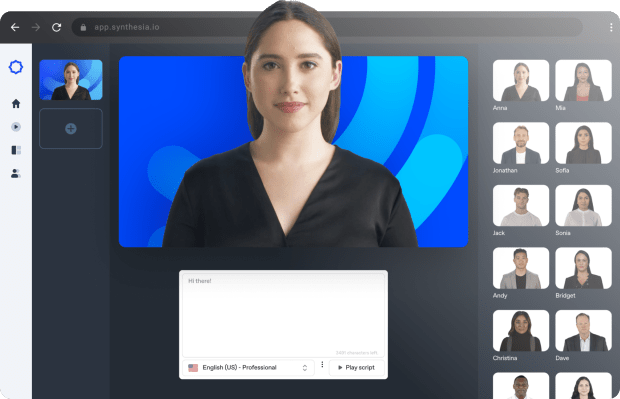Synthesia, a startup using AI to create synthetic videos, is walking a fine, but thus far prosperous, line between being creepy and being pretty freakin’ cool.
Today, it announced the close of a $50 million Series B funding round led by Kleiner Perkins, with participation from GV and existing investors Firstmark Capital, LDV Capital, Seedcamp and MMC Ventures.
Synthesia allows anyone to turn text or a slide deck presentation into a video, complete with a talking avatar. Customers can leverage existing avatars, created from the performance of actors, or create their own in minutes by uploading some video. Users also can upload a recording of their voice, which can be transformed to say just about anything under the sun.
The startup, aware of the fact that almost any powerful tool on the internet can be used for evil, is focusing exclusively on enterprise clients, rather than allowing anyone and everyone to hop on the platform. These customers predominantly use the tool for training videos, it said, but also use Synthesia for monthly updates to the broader team or delivering information that would normally come via email.
Interestingly, founder Victor Riparbelli said that user behavior didn’t necessarily match up to his earlier expectations. Rather than seeing tons of usage from video production departments, other folks inside the organization are the power users of the tool.
“Anyone who, before Synthesia, could produce a slide deck or write a Word document can now actually create video content,” said Riparbelli. “I think that’s the key thing that is making us grow so fast from an AI perspective.”
Since raising a $12.5 million Series A in April, Synthesia has added features that make it even easier for users to create their own animated talkers, and the platform now has 1,000 custom avatars in use. Riparbelli cited Ernst & Young as an example customer. The firm has 35 partners with their own avatars, creating videos for both internal comms and client communication.
The “anyone can make video” concept gives me very strong Canva vibes. The $40 billion Australian startup shot up like a rocket after unlocking the ability to design — anything — for the rest of the organization outside of the design department. Canva also launched its own video product recently, focusing more on turning existing designs and slide decks into animated, lively videos.
The startup takes that a step further with the ability to create videos featuring an avatar that looks and feels like a real person, either an unknown actor or the CEO of your own company.
Synthesia isn’t the only company doing work in its problem space. An Israeli company called D-ID actually demo’d their tech at Disrupt 2021, showing how they can take a still image of a person and turn it into video content.
In other words, the race is on, in a few ways. Companies looking to make video creation easier through AI and avatars must not only race to increase realism and add in a sliding scale for emotional expression, etc., but they must also ensure the safety of users and the credibility of their own platforms.
It’s plain as day to see how these types of tools could be used to mislead or do harm to large numbers of people, and it’s up to the companies creating these tools to ensure they’re used in an above board fashion.
For Synthesia’s part, the company is pretty clear about not synthesizing anyone without explicit consent, and the tech is only accessible via an on-rails experience fully controlled by the company.
All that said, don’t be surprised to see a video from your department head or CEO, but not quite them, in the near future.
